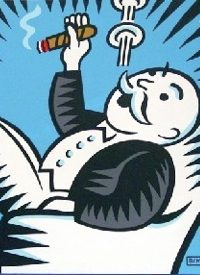
President Obama’s 2013 budget and proposed tax increases have been construed as a direct assault on the wealthy Republican class. But according to past election analyses, and despite the prevailing notion that America’s wealthy overwhelmingly oppose progressive taxation, the President may in fact be targeting his own base.
In a New York Times article published Monday, John Harwood seeks to debunk the myth that Republicans are the party of the affluent, indicating that the class-warfare sentiment permeating throughout Obama’s new budget plan does not generate a strictly partisan electoral effect. "You would not know it from Republican cries of class warfare swirling around Mr. Obama’s new budget, which reiterates his calls for higher taxes on individuals earning more than $200,000 and households earning more than $250,000," Mr. Harwood affirms. "Conventional understanding of election-season populism assumes that the president will be looking to stick it to die-hard Republicans."
The reality is that, over the years, a sizable group of wealthy Americans have drifted over to the Democratic Party (although how long they’ll stay there is up for debate). Jimmy Carter captured the presidency in 1976, despite trailing Republican incumbent Gerald Ford 62 percent to 38 percent among Americans in the highest income group, which included those earning more than $20,000 (about $80,000 in today’s terms).
By 2000, Harwood continues, Vice President and Democratic presidential nominee Al Gore lagged behind George W. Bush 54 percent to 43 percent among those in the highest income group, a much narrower gap than in the 1970s. In his 2008 triumph, Barack Obama outrivaled Arizona Senator John McCain 52 percent to 46 percent among those Americans in the top income group, furthering the trend, and for the first time in decades, delivering Democrats with the seemingly dreaded label of "party of the wealthy." Moreover, Harwood added:
Mr. Obama also continued the Democrats’ progress among the much larger group of upper-middle-class voters. In counties with above-average incomes that the research organization Patchwork Nation calls Monied ’Burbs, Mr. Obama received 55 percent of the vote, up from the 49 percent President Bill Clinton received in 1996, the 43 percent that the Democratic nominee Michael Dukakis received in 1988 and the 36 percent Mr. Carter received in 1980.
Many liberal critics have sought to capitalize on this notion by asserting that wealthy individuals have come to a revelation that President Bush’s brand of "conservatism" was too radical — and, in turn, these individuals have come to "see the light." This is certainly the argument coming from former Slate columnist Daniel Gross, who only a week after the 2008 election argued that "angry yuppies who’ve hugely benefited from President Bush’s tax cuts… have become so outraged and alienated by the incompetence, crass social conservatism, and repeated insults to the nation’s intelligence of the Bush-era Republican Party that they’re voting with their hearts and heads instead of their wallets."
Other critics have suggested that the 2008 election was more of a sanctimonious shift, and that many wealthy Americans were simply responding to Joe Biden’s declaration that paying higher taxes is patriotic. "Like Warren Buffett, some of the wealthy may feel it is time to raise their own taxes for the betterment of the country," the Wall Street Journal’s Robert Frank wrote soon after the election. "There may be some voters — more likely those in Upper Richistan rather than those in the $200,000-plus group — who think a shared sacrifice among the rich is necessary to get the American wealth-creation machine moving again."
But despite consistent growth in the number of affluent Democrats, some analysts predict that the 2012 election may reverse the trend, due in part to Obama’s class-warfare rhetoric and his relentless push for tax increases on high-income earners. In the past several months, the President has made countless speeches on issues relating to income inequality and economic regulations. In these monologues, Obama has aggressively underscored that banks and financial institutions were largely responsible for the economic recession.
For instance, during a visit to Osawatomie, Kansas, where President Theodore Roosevelt first broadcasted his vision for "New Nationalism," Obama presented an extensive diatribe on income inequality. In his remarks, the President railed against deregulation and the "breathtaking greed" of those who purportedly ignited the recession:
Now, for many years, credit cards and home equity loans papered over this harsh reality [the growing wealth gap]. But in 2008, the house of cards collapsed. We all know the story by now: Mortgages sold to people who couldn’t afford them, or even sometimes understand them. Banks and investors allowed to keep packaging the risk and selling it off. Huge bets — and huge bonuses — made with other people’s money on the line. Regulators who were supposed to warn us about the dangers of all this, but looked the other way or didn’t have the authority to look at all.
It was wrong. It combined the breathtaking greed of a few with irresponsibility all across the system. And it plunged our economy and the world into a crisis from which we’re still fighting to recover. It claimed the jobs and the homes and the basic security of millions of people — innocent, hardworking Americans who had met their responsibilities but were still left holding the bag.
These criticisms, among other factors, seem to have taken a toll on Obama’s reelection campaign, as former donors who contributed lavishly to his 2008 campaign have turned to the President’s GOP counterparts, particularly former Massachusetts Governor Mitt Romney. Indeed, after defeating McCain four years ago with donations from the securities, hedge-fund, and banking sectors, Obama is now seeing Romney gather far more donations from each of them, according to the Center for Responsive Politics.
On the voter front, a New York Times/CBS News poll released last week found that Mitt Romney beats out Obama 47 percent to 43 percent among voters earning more than $100,000, despite Obama enjoying a six-percent lead in a head-to-head matchup. While some critics explain that congressional gridlock and other political factors are to blame, one can only wonder whether President Obama’s class-warfare sentiment and push for higher taxes on the wealthy may be reversing a three-decade-long trend.
Illustration: Parker Brothers’ Monopoly™ game’s depiction of a wealthy man



